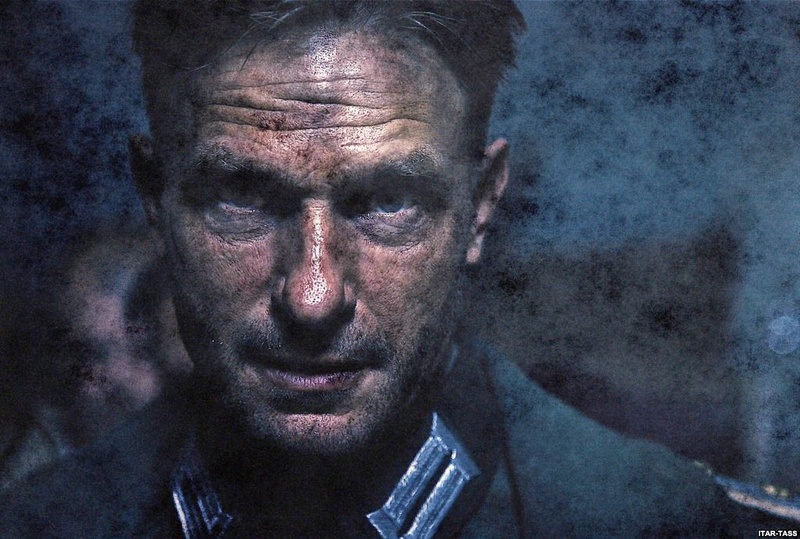To an American viewer, “Stalingrad” is a mediocre Hollywood-style 3D war epic made in Russia. To a Russian filmgoer, though, “Сталинград” is the most technically impressive film made on native soil in a decade-long revival of big Russian movies. It is the highest-grossing Russian film of all time ($67 million gross on a $30 million budget at the time of writing) and the first IMAX 3D Russian film. The production value of “Stalingrad” is as good as anything in the war-film genre that Hollywood majors put out. The most frequently visited parts of the huge bombed-out city on film were a massive constructed set, while the rest of the city was created with very high-quality compositing. Moreover, the flamethrower shots in several of the battle scenes are better than any Hollywood action film set pieces in recent memory. These are all phenomenal achievements for an industry that lacks the established financing structure and centrality of talent that make possible the two superpowers of big-budget production, Los Angeles and Mumbai. The film’s producers actually cobbled together the money to make the film largely from Russian government sources.
In The New York Times, Maria Smolnikova, the film’s female lead, said, “In terms of its scope, quality and standards, I think it is of American standards, of the sort few have attempted here, something really venturesome.” The production team has gotten their wish—”Stalingrad” will be distributed widely in the U.S. by Columbia Pictures. It is very exciting that Russia is again turning out big-budget movies that can be evaluated with the same standards as their American counterparts.
{shortcode-eb4036af7a6ce8b046113228708e217f08f33481}
Stalingrad is the story of a small group of Soviet soldiers marooned in an abandoned apartment complex during the the city’s infamous siege. The movie starts and ends very big—opening with huge crowd shots of Soviets crossing the Volga and closing with hundreds of Germans moving into the city—but spends most of its time zoomed into its small cast. Five battle-weary Russian soldiers and one 18-year-old resident of the apartment complex converge “as if by instinct” and take shelter. Each of these people is a well-wrought caricature—there is handsome artilleryman Sergey (Sergey Bondarchuk); a fresh face who is courageous “but not with girls” Nikiforov (Aleksey Barabash); an ex-tenor Krasnov (Oleg Volku); a virtuous middle-aged man Polyakov (Andrey Smolyakov); the hyper-aggressive young Chvanov (Dmitriy Lysenkov); and the 18-year-old Katya (Mariya Smolnikova). Nothing happens in the movie that makes explaining them beyond this worthwhile. They watch each other’s backs, snipe at and perpetrate small attacks against the Germans, look to the sky in despair, and make action movie quips: “In Stalingrad, even broken tanks shoot.” Yes, they do.
The Germans laying siege on the Russian heroes are Captain Kan (Thomas Kretschmann) and his boss, Khenze (Heiner Lauterbach). Khenze is a Nazi villain in a long tradition—he listens to classical music and eats on a white tablecloth in the morning and orders women and children to be burned alive in the afternoon. There is a history of one-sided depictions of Germans in Russian culture going all the way back to origins of the language—the Russian word for German, “немецкий,” is recognized as innately derogatory, as it comes from the Russian word for “mute.” However, “Stalingrad” does humanize one German: Captain Kan. Kan is shown to be sad he lost his wife at home—he sleeps with a Russian woman named Masha (Yanina Studlina), or as Chvanov calls her, a “kraut-whore.” Regardless, he is portrayed in a much more negative light than the Russians, who have an infinite capacity for brotherhood and sexual restraint.
Outside of the realm of vicious action sequences, visual effects and the outdoor production design laid out above, Stalingrad is basically an efficiently directed and acted film. Though there is not much offensive in the performances, there is not much memorable either.
Of course, the movie appeals to Russian nationalism—Russians are deservedly extremely proud of victory at “Stalingrad.” Just this year, the city of Volgograd renamed itself Stalingrad for a day in commemoration of the battle. However, the movie did harp on nationalism—there was a voice-over that used the first-person possessive “our huge country” and more than a few slow-motion scenes in which the men run screaming all “300”-like into combat. Still, for a Russian film, “Stalingrad” shows decent self-discipline on the “Russia is the best, Russia is the most honorable, Russia is the toughest” front.
The New Yorker critic Pauline Kael described the American flag-thumping Vietnam flick “The Deer Hunter” as having “a romantic adolescent boy’s view of friendship” and “implicit God-and-country, flag-on-the-door political assumptions.” This is about the extent of Stalingrad’s sins in this regard, which, in light of the xenophobia of other Russian hit films released in the last 10 years—the “Брат” (“Brother”) series and “Тара́с Бу́льба” (“Taras Bulba”)—is really not so bad.
Read more in Arts
"Non-Stop" Falters













